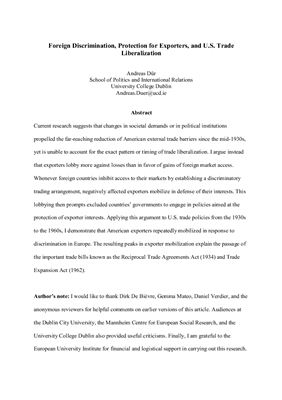Курс Политическая Экономика
Andreas D?r "Foreign Discrimination, Protection for Exporters, and U.S. Trade Liberalization", 2007, 47p.
Abstract
Current research suggests that changes in societal demands or in political institutions propelled the far-reaching reduction of American exteal trade barriers since the mid-1930s, yet is unable to account for the exact patte or timing of trade liberalization. I argue instead that exporters lobby more against losses than in favor of gains of foreign market access. Whenever foreign countries inhibit access to their markets by establishing a discriminatory trading arrangement, negatively affected exporters mobilize in defense of their interests. This lobbying then prompts excluded countries’ govements to engage in policies aimed at the protection of exporter interests. Applying this argument to U.S. trade policies from the 1930s to the 1960s, I demonstrate that American exporters repeatedly mobilized in response to discrimination in Europe. The resulting peaks in exporter mobilization explain the passage of the important trade bills known as the Reciprocal Trade Agreements Act (1934) and Trade Expansion Act (1962).
Andreas D?r "Foreign Discrimination, Protection for Exporters, and U.S. Trade Liberalization", 2007, 47p.
Abstract
Current research suggests that changes in societal demands or in political institutions propelled the far-reaching reduction of American exteal trade barriers since the mid-1930s, yet is unable to account for the exact patte or timing of trade liberalization. I argue instead that exporters lobby more against losses than in favor of gains of foreign market access. Whenever foreign countries inhibit access to their markets by establishing a discriminatory trading arrangement, negatively affected exporters mobilize in defense of their interests. This lobbying then prompts excluded countries’ govements to engage in policies aimed at the protection of exporter interests. Applying this argument to U.S. trade policies from the 1930s to the 1960s, I demonstrate that American exporters repeatedly mobilized in response to discrimination in Europe. The resulting peaks in exporter mobilization explain the passage of the important trade bills known as the Reciprocal Trade Agreements Act (1934) and Trade Expansion Act (1962).

